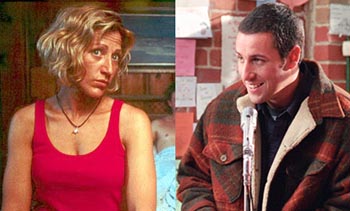![[Metroactive Movies]](/movies/gifs/movies468.gif)
[ Movies Index | Show Times | Silicon Valley | Metroactive Home | Archives ]
Words and 'Deeds'
Adam Sandler dumbs down populism in 'Mr. Deeds,' while John Sayles massages liberals in 'Sunshine State'
By Richard von Busack
ADAM SANDLER'S comedy relies heavily on grievance. Without addressing that grievance, criticizing his work as stupid misses something. Sandler's Mr. Deeds opens on the same day as John Sayles' Sunshine State, and it's easy to guess which will make the most money. For years, the converted have thrilled to the eloquence of Sayles' preaching, and yet there's no way Sayles' film can appeal to working-class viewers as much as Sandler's can.
What might have seemed like Sandler's crossover project offers more of his usual battering-ram approach. He plays Longfellow Deeds, a pizza-parlor owner in Mandrake Falls, N.H., who inherits $4 billion. Deeds comes to New York, where he's made fun of as a hick with unearned wealth.
Compared to Longfellow Deeds' travails in Frank Capra's 1936 hit, Mr. Deeds Goes to Town, starring Gary Cooper, nothing much happens. No desperate farmer tries to shoot Deeds as revenge for being a rich do-nothing while working people starve. No one conspires to send this year's Deeds to a mental hospital.
The original Mr. Deeds Goes to Town won Republican Capra an Oscar for Best Director, and it was considered daring for addressing the class war. It was a populist film, yes, and one definition of a populist film is that anyone can read his own politics into it. Cut Mr. Deeds Goes to Town open, and what's revealed is a call for volunteerism: words, not Deeds. It's such an essentially mild film that Ronald Reagan used to quote bits from it in his speeches.
This remake is perhaps Sandler's unfunniest movie, as well as his most dramatically inert. Deeds, an unpretentious guy who likes pranks and enjoys egging cars, doesn't have anything to learn. He's perfect from the beginning to the end, and his hometown worships him.
The sole purpose of money, according to Mr. Deeds, is that it allows you to beat up anyone you want. The crowd I saw the film with loved the part where Deeds knocks over a big, fat opera singer, and the singer, on the ground, murmurs, "I think I just shit myself." That's the kind of joke Mussolini's thugs used to implement with castor oil.
For once, Sandler has a serious leading lady, Winona Ryder, who takes the Jean Arthur part of a cynical reporter. Ryder, insufficiently masking her disgust, tries to play off Sandler's egotism by going broad and fluttery. Who knows if there's any truth to the criminal charge facing Ryder? But after appearing in a movie like this, a little shoplifting would certainly make you feel clean again.
Sunshine State certainly displays more ambition, but it's more earnest, too. Although the acting is excellent, you can almost hear the rustle of papers while you're watching the film. Sunshine State's main subject is the continuing despoliation of Florida--a juicy topic. But Sayles' undertone is about race and class in America, and how even low-budget living is becoming too costly for the poor. The development of a traditionally African American town of Lincoln Beach spurs the action. The area's future seems to be gated communities, which some of the locals are trying to hold off.
The ensemble includes Edie Falco as the hard-drinking owner of a motel/cafe, which she hates but refuses to sell off. As always, Falco is tremendous. Never outside a French film will you see how sexy moroseness can look. Mary Alice, who plays a stiff-necked old woman, impresses you with her forcefulness; she displays the gravity of a woman who never misses a thing. Your sympathy goes out to Angela Bassett as this tough woman's prodigal daughter.
Sayles' politics are worked out thoroughly, but Sunshine State is sometimes juiceless because of the calculation. In some of his earlier films--Matewan and Brother From Another Planet--Sayles still possessed a low-budget, AIP-style energy. Today, his writing is more careful, his films are longer, his energy gone into assembling a cross-section cast and moving them around. And his films now are as firmly targeted to an audience of middle-aged liberals as Mr. Deeds is pitched to angry young men caught in jobs and schools they hate.
I wish there was a way Sayles could broaden his appeal without becoming vague. As Alistair Cooke said of Capra when Mr. Deeds Goes to Town came out, Sayles is beginning to make films about themes instead of people. But look at his competition! Sandler, if asked, would tell you there was nothing political about his remake. Do the filmmakers mean to imply the gulf between the rich and the poor in the United States died with the Great Depression? I suppose the audience could wise them up.
Mr. Deeds (PG-13; 91 min.), directed by Steven Brill, written by Steven Brill, photographed by Peter Lyons Collister and starring Adam Sandler and Winona Ryder, opens Friday valleywide.
[ Silicon Valley | Metroactive Home | Archives ]
![]()

Morose and Moronic: Edie Falco suffers in 'Sunshine State'; Adam Sandler mugs in 'Mr. Deeds.'
Sunshine State (PG-13; 141 min.), directed and written by John Sayles, photographed by Patrick Cady and starring Edie Falco, opens Friday at the Camera 3 in San Jose and the Guild in Menlo Park.
Send a letter to the editor about this story
.
From the June 27-July 3, 2002 issue of Metro, Silicon Valley's Weekly Newspaper.